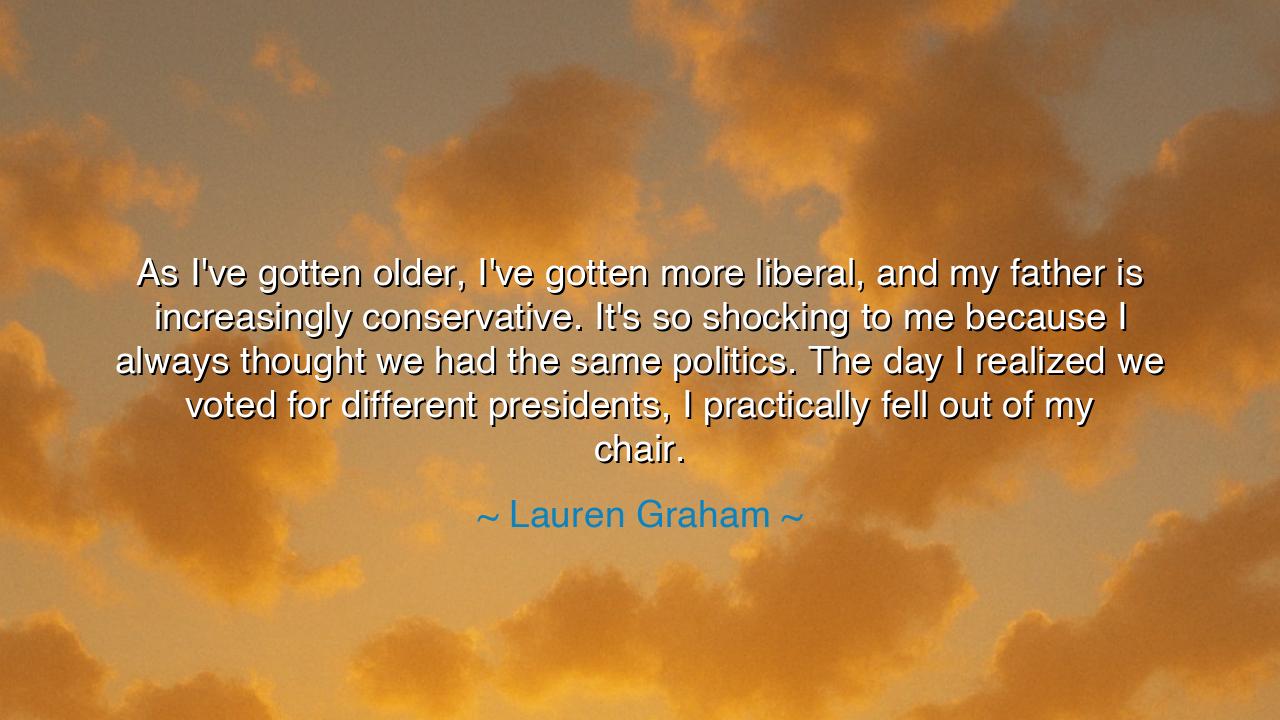
As I've gotten older, I've gotten more liberal, and my father is
As I've gotten older, I've gotten more liberal, and my father is increasingly conservative. It's so shocking to me because I always thought we had the same politics. The day I realized we voted for different presidents, I practically fell out of my chair.






Hear, O seekers of harmony, the astonished words of Lauren Graham: “As I’ve gotten older, I’ve gotten more liberal, and my father is increasingly conservative. It’s so shocking to me because I always thought we had the same politics. The day I realized we voted for different presidents, I practically fell out of my chair.” In this confession lies the eternal riddle of family and change, where love binds souls, yet politics reveals unexpected distance.
For Graham speaks of the journey of life, where age brings new experiences, and with them new visions. She grew toward the liberal, seeking openness, progress, and change, while her father leaned toward the conservative, holding fast to tradition and caution. What once seemed a shared path divided quietly, until the day of elections revealed that even those bound by blood may not be bound by belief.
History has seen such divisions many times. In the American Civil War, families were torn apart when sons chose the Union and fathers the Confederacy. Brothers fought on opposite sides of the battlefield, not because they loved one another less, but because their convictions diverged under the weight of history. So too in Graham’s story, though no cannon thundered, the shock of difference still struck like lightning at the heart of kinship.
The deeper meaning of her words is this: politics is not merely about governments and laws—it is about identity, values, and vision for the world. To realize that a beloved parent or child stands on the opposite shore is to feel both estrangement and grief. Yet it is also an opportunity to practice patience, to listen, and to remember that bonds of love must sometimes carry us across rivers of disagreement.
Therefore, O children of wisdom, let this be your lesson: do not despair when you discover difference in those you love. For unity of heart need not demand uniformity of thought. The surprise that struck Lauren Graham is one shared by many, but it is not a death of love—it is a call to deeper understanding. Let the family table become a place of dialogue, not war, for the true measure of kinship is not sameness, but endurance in affection.






ALMinh Anh Le
Graham’s experience of discovering her and her father’s differing political views raises a thought-provoking question: How often do we really reflect on the political divide within our own families? The shift from shared politics to distinct ones seems natural as people get older, but how do we deal with these differences? Is it possible to respect differing political views in close relationships, or does it always lead to tension and confusion?
UGUser Google
Lauren Graham’s moment of realization that she and her father voted for different presidents is striking. It’s a reminder of how politics can divide even those closest to us. Does this shift in political alignment reflect a broader societal trend, or is it simply an indication of her own personal growth? I wonder how many other families experience this kind of divide, and how it affects the way we understand and relate to one another politically.
TVNguyẽn Tuán Vỹ
I can relate to Lauren Graham’s surprise at the political differences between her and her father. It’s fascinating how political views can evolve so differently within families, especially when we expect to share similar values. But does this realization signify a deeper generational divide? Should it be a cause for concern, or is it just a natural outcome of personal growth and differing life experiences? It’s interesting to think about how these differences shape relationships.
TVtran vy
Graham’s reflection on how her politics have shifted while her father’s have become more conservative is a reminder of how personal beliefs can evolve. It also raises an interesting point about generational differences. How much of this shift is tied to age, and how much is shaped by broader societal changes? Is it common for people to gravitate towards more liberal views as they get older, or does it depend on individual experiences?
NDNhat Duy
Lauren Graham’s experience of realizing that she and her father have different political views is something many people can relate to. It’s interesting how political ideologies can shift over time, even within families. But is it always such a shock when those shifts happen? Shouldn’t we expect some evolution of views as we age, based on our changing experiences and perspectives? How can we navigate these political divides while still maintaining strong family bonds?